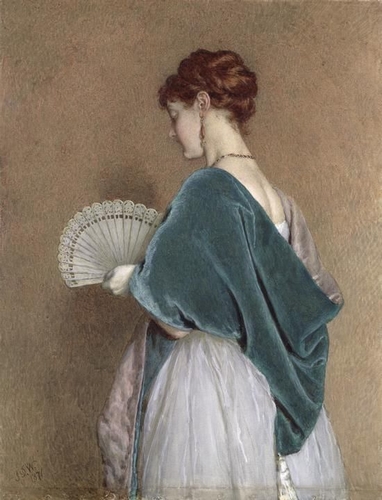
Mozart wrote about thirty songs, distributed throughout all his life: from An die Freude, composed when he was twelve, until the last three (Sehnsucht nach dem Frühlinge, Im Frühlingsanfang and Das Kinderspiel) written on January 14th, 1791. I would say that his record was three songs in a day, but for him, it was usual to write them in batches; In May 1787, for example, he wrote four during a week. Today we're listening to one of them, Lied der Trennung, K. 519.
The poem that Mozart musicalized was published in 1785 at the Göttinger Musenalmanach, the literary magazine published by the Göttinger Hainbund, a group of which we spoke a few weeks ago. The poet, Klamer Schmidt, uses fifteen! stanzas of eight verses to complain because he's separated from Luisa, and wondering if she will forget him. He must have missed her very much! Given that the poet knew Luise Abel, who eventually became his wife, the year he wrote the poem (1779), we can imagine that he was full of love and doubts…
Mozart "only" chose seven stanzas for his Lied, which has a peculiar structure. It begins as a pure strophic song, with a stanza ended by a brief interlude that some performers add as a prelude. After four identical stanzas, however, the music changes. Did Mozart think that if people listened one more time the same music they would become impatient? By no stretch of the imagination, it is im-pos-si-ble to get tired of Mozart's music. The four first stanzas share the last three verses; the last three don't and, in addition, have a different metrics; maybe the change of the music has something to do with this... yes, I like it better. From the fifth stanza on, the gentle music becomes more ... more ... more Ach, ich fühl's of Pamina's? For example. It's a beautiful Lied, and I'm sharing the also beautiful performance by Konrad Jarnot and Alexander Schmalcz. You'll see that the lyrics have just six stanzas; in most recordings, and this one isn't any exception, singers skip the second one. You know, a common practice in pure strophic songs.
Before listening to our Lied, I would like to mention other "Luise" in songs. I would say that Schmidt is quite unknown today, but at his time, his poem had some repercussion; It had even an answer, published in the Göttinger Musenalmanach in 1787. Ludwig Kosegarten published Luisens Antwort (Luise's answer), with a similar structure to that of Klamer Schmidt's poem, which begins with these verses that clearly remind us to it:
Wenn Liebende sich trennen.
Wie werd’ ich leben können,
Geliebter, ohne dich!
Now, I leave you now with Lied der Trennung, of my much beloved Mozart, especially dedicated to @harteconchache and @vestirlaopera, two art experts (their Twitter accounts are well worth a look) that helped me to identify the painting that ilustrates this post. I save it but didn't keep the reference... Thank you both!
Die Engel Gottes weinen,
Wo Liebende sich trennen;
Wie werd ich leben können,
O Mädchen, ohne dich?
Ein Fremdling allen Freuden,
Leb ich fort an dem Leiden!
Und du? Und du?
vielleicht auf ewig vergißt Luise mich!
vielleicht auf ewig vergißt sie mich!
Im Wachen und im Traume,
Werd ich Luise nennen;
Den Namen zu bekennen,
Sei Gottesdienst für mich;
Ihn nennen und ihn loben
Werd ich vor Gott noch droben.
Und du? Und du?
vielleicht auf ewig vergißt Luise mich!
vielleicht auf ewig vergißt sie mich!
Ich kann sie nicht vergessen;
Dies Herz, von ihr geschnitten,
Scheint seufzend mich zu bitten:
„O Freund, gedenk an mich!“
Ach dein will ich gedenken,
Bis sie ins Grab mich senken.
Und du? Und du?
vielleicht auf ewig vergißt Luise mich!
vielleicht auf ewig vergißt sie mich!
Vergessen raubt in Stunden,
Was Liebe jahrlang spendet.
Wie eine Hand sich wendet,
So wenden Herzen sich.
Wenn neue Huldigungen
Mein Bild bei ihr verdrungen,
O Gott! Vielleicht auf ewig
Vergißt Luise mich.
Ach denk an unser Scheiden!
Dies tränenlose Schweigen,
Dies Auf- und Niedersteigen
Des Herzens drücke dich
Wie schweres Geist-Erscheinen,
Wirst du wen anders meinen,
Wirst du mich einst vergessen,
Vergessen Gott und dich.
Ach denk an unser Scheiden!
Dies Denkmal, unter Küssen
Auf meinen Mund gebissen,
Das richte mich und dich!
Dies Denkmal auf dem Munde,
Komm ich zur Geisterstunde,
Mich warnend anzuzeigen,
Vergißt Luise mich.
Vergißt sie mich.














Comments powered by CComment